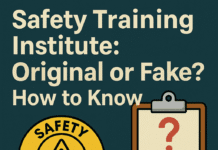
Certified Safety Professional Course in India: A Comprehensive Guide
Introduction
Certified Safety Professional Course in India : In today’s fast-paced world, workplace safety has become a top priority for organizations across industries. With an increasing emphasis on employee well-being and legal compliance, the demand for Certified Safety Professionals (CSPs) is on the rise. This article aims to provide a comprehensive guide to the Certified Safety Professional course in India, covering its significance, benefits, eligibility criteria, course content, and career prospects.
The Certified Safety Professional Course in Detail
The Certified Safety Professional (CSP) course is designed to equip individuals with the knowledge and skills required to identify workplace hazards, assess risks, and implement effective safety measures. The course is a comprehensive blend of theory, practical exercises, and case studies to ensure a thorough understanding of occupational safety.
1. What is a Certified Safety Professional?
A Certified Safety Professional (CSP) is a qualified expert responsible for the development, implementation, and management of safety programs in various organizations. They play a crucial role in ensuring compliance with safety regulations, minimizing accidents, and creating a secure work environment for employees.
2. The Importance of Becoming a CSP
Becoming a Certified Safety Professional offers numerous advantages. Apart from the personal growth and satisfaction of contributing to a safer work environment, CSPs enjoy high demand and recognition in the job market. They are often seen as invaluable assets to any organization seeking to uphold safety standards and protect their workforce.
3. Benefits of Getting Certified
The benefits of obtaining a CSP certification extend beyond professional growth. Certified Safety Professionals are eligible for higher salaries, better job prospects, and increased career opportunities both within their current organization and in other sectors.
4. Eligibility Criteria for the CSP Course
To enroll in the CSP course, candidates must meet certain eligibility criteria. Generally, a bachelor’s degree in a related field and relevant work experience are required. Additionally, candidates may need to pass a qualifying exam to demonstrate their knowledge of safety principles.
5. Overview of the CSP Course
The CSP course is usually divided into ten modules, each focusing on different aspects of occupational safety. Let’s delve into each module in detail.
Module 1: Fundamentals of Occupational Safety
This module lays the foundation by introducing participants to occupational hazards, risk assessment, and safety regulations and standards.
Module 2: Safety Management Systems
In this module, participants learn how to develop safety policies, conduct incident investigations, and plan for emergencies.
Module 3: Occupational Health and Ergonomics
This module covers topics related to workplace health promotion, ergonomic risk management, and stress management.
Module 4: Environmental Safety
Participants gain insights into environmental regulations, pollution prevention, and sustainability practices in this module.
Module 5: Fire Safety and Emergency Preparedness
Fire prevention, protection, safety audits, and disaster response planning are covered in this module.
Module 6: Safety Training and Communication
This module focuses on designing effective training programs, safety communication strategies, and behavioral safety techniques.
Module 7: Legal Aspects of Safety
Participants learn about labor laws, the role of regulatory authorities, and liability and compensation issues in this module.
Module 8: Industrial Hygiene and Hazardous Materials
Identifying workplace hazards, controlling chemical risks, and health risk assessments are key topics in this module.
Module 9: Construction Safety
Safety measures in construction sites, machinery safety, and fall protection are discussed in this module.
Module 10: Transportation Safety
This module covers road safety management, logistics safety, and safety measures in aviation and maritime sectors.
Conclusion
The Certified Safety Professional course equips individuals with the expertise to enhance workplace safety and protect employees from potential hazards. By becoming a CSP, professionals can open up new opportunities and play a crucial role in creating secure and productive work environments.
FAQs (Frequently Asked Questions)
- Is the Certified Safety Professional course recognized globally?
- Yes, the CSP certification is widely recognized and respected internationally.
- What are the prerequisites for enrolling in the CSP course?
- Candidates typically need a bachelor’s degree in a related field and relevant work experience.
- How long does it take to complete the CSP course?
- The duration of the course varies, but it usually takes a few months to a year to complete.
- Do I need to renew my CSP certification periodically?
- Yes, CSPs are required to renew their certification every few years through continuing education and professional development.
- Can CSPs work in any industry?
- Yes, Certified Safety Professionals can work in various industries, including manufacturing, construction, healthcare, and more.





















